Here you’ll find papers, slides, and information on my recent conference presentations. I make materials available from my talks to share with folks who can’t attend conferences, to give attendees information to draw from and think about (and cite!) later, and to circulate my work more widely beyond individual meetings and disciplines.
Association of Computing Machinery Special Interest Group on the Design of Communication (ACM-SIGDOC) 2023
“Designing Feminist Methodologies: Foregrounding Gender, Positionality, and Justice in Communication Design Research”
Orlando, FL; October 2023
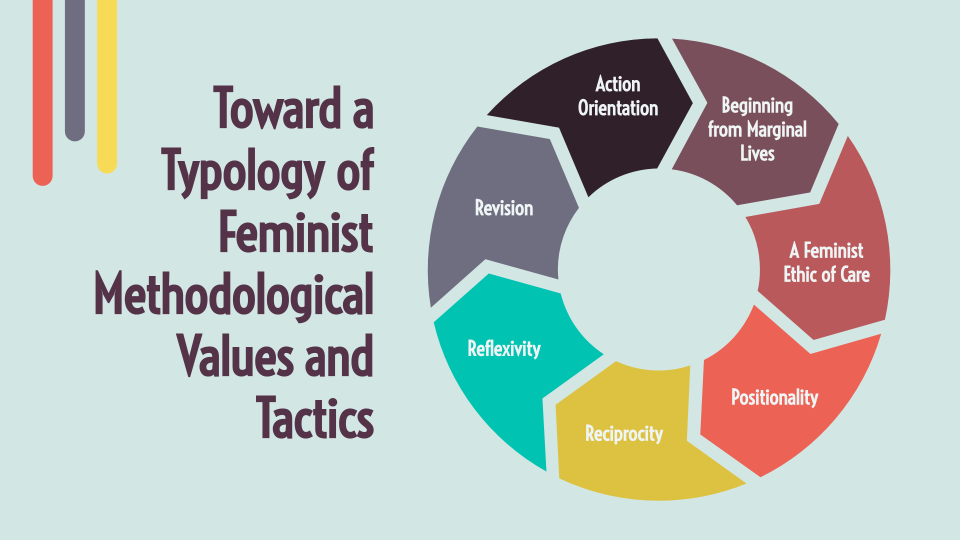
While several studies from ACM-SIGDOC have used feminist research methodology as a frame, there exists no clear definition of what constitutes feminist methodology for the organization’s constituencies, or how it can be applied. To generate a baseline understanding of the field’s understanding of feminist methodologies, I conducted a survey of technical and professional communication (TPC) and communication design scholars, which asked four questions about how they defined these types of research frameworks, and whether they used such frameworks in their own scholarship. I report the results of this survey and use participants’ responses, alongside previously published scholarship in the field, to create a taxonomy of feminist methodological values that can guide research in TPC and communication design. I conclude with a description of practical tactics that researchers can use to align their projects with these values and integrate feminist methodology into their work. [ Proceedings Paper (Open Access through ACM Digital Library) | Slides ]
College English Association (CEA) 2022
“Engagement, Representation, and Action: Universal Design for Learning in Writing Classrooms“
Birmingham, AL; March 2022
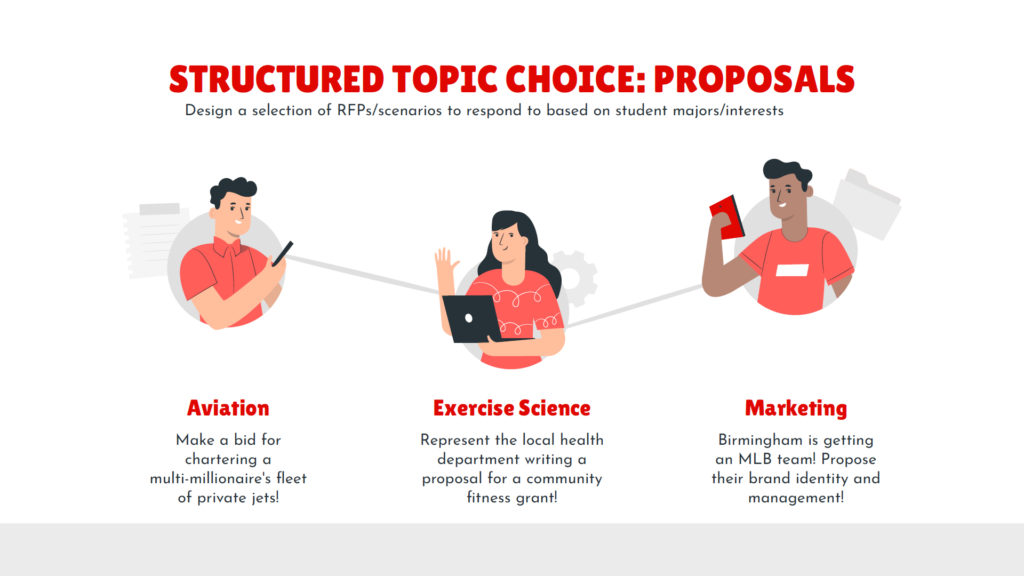
As participant and moderator in the panel “Reimagining the Writing Classroom: Amplifying Difference and Justice Across Curriculum Design,” I contributed to a discussion of interventions into pedagogy that foreground justice in a variety of ways. My co-panelists Dr. Cara Marta Messina, Mr. Matthew Hill, and Professor Emrys Donaldson provided takeaways from their teaching at our rural regional comprehensive university that can be adapted to a wide range of schools and courses. My talk described strategies for universal design for learning (UDL) that focused on flexible assignment deliverables, to boost accessibility and accountability to a diverse student population. [ Slides | Handout ]
Association for Computing Machinery Special Interest Group on Design of Communication (ACM-SIGDOC) 2021
“Feminist Approaches for Communication Design Research“
Online; October 2021
![A screenshot of the video of Allegra's 2021 SIGDOC presentation, "Feminist Approaches for Communication Design Research." Allegra reads in a thumbnail at the top right of the screen, which features a drawing of a woman typing at a laptop. Text reads "Feminist Approaches in Technical Communication Research. Qualitative Methodologies: feminist interviewing, survey design, observation/ethnography, etc. that begin their inquiry in underrepresented communities. User Research as Feminist Act: renders "the invisible visible, bringing the margin to the center, [and] rendering the trivial important" (Reinharz, 1992). Feminist Research Stance: Positionality of the researcher enriches the project, informing the methods chosen to collect data and interact with participants."](http://allegra-w-smith.com/wp-content/uploads/2022/02/smith_sigdoc2021_thumbnail-1024x578.jpg)
As a participant in the panel “Local Users, Global Takeaways: Methodological Considerations for Audience Advocacy in Communication Design Research,” I outlined methodological practices grounded in feminist theory that attend to the human needs of technology users. Highlighted in this presentation are access to research communities and consent of participants, employing cross-cultural listening frameworks, and practicing reciprocity. Alongside co-panelists Dr. Sweta Baniya and Dr. Nupoor Ranade, I also published a paper on methodology in the conference proceedings. [ Video of Talk | Transcript ]
Modern Languages Association (MLA) 2021
“Aging Bodies and Minds in the Design of Communication”
Online; January 2021
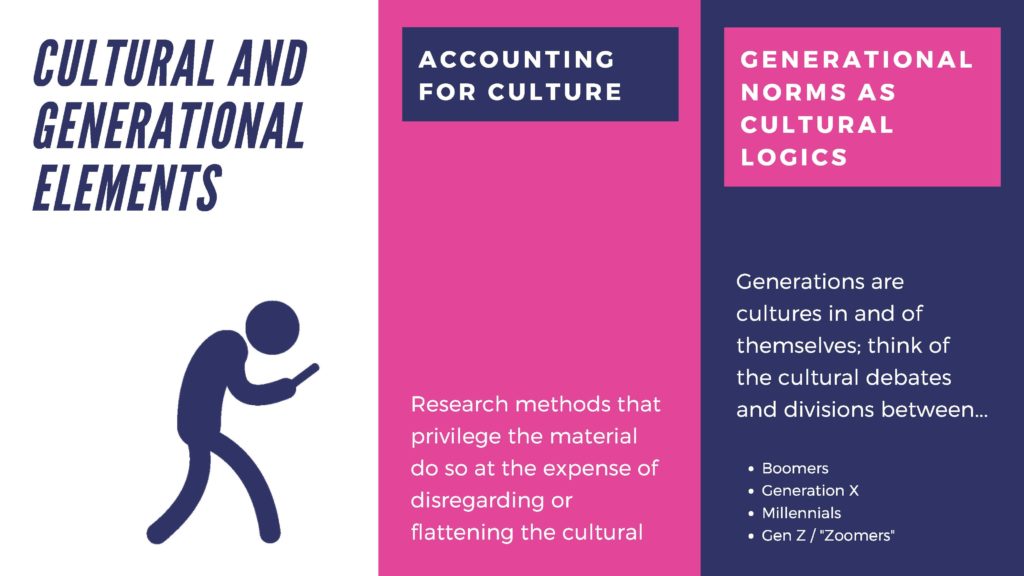
The MLA forum for Age Studies organized a panel on “Writing, Designing and Narrating Old Age” at the virtual annual convention in 2021. Alongside Dr. Lauren Marshall Bowen, Dr. Louise Wetherbee Phelps, and Dr. Katherine Silvester, I shared research on older adults’ literate experiences. This presentation explores why older adults’ aged 70+ place rhetorical distance between themselves and their technological devices through three lenses: 1) obtrusion/intrusion, 2) cultural logics, and 3) exclusionary design practices. [ Slides ]
Computers & Writing 2019
Collaborative Panel: “Developing Digital Literacies Inside and Outside of Classrooms”
East Lansing, MI; June 2019
As users enter and write within new digital contexts, they bring their previous experiences with technologies and texts to new situations, transferring and transforming their understandings. This panel examines three distinct applications of digital literacies and their ethical implications: what meta-literacies instructors use when commenting on student writing, how entrepreneurs construct their digital identities, and what influences shape technological access for older adults aged 60+.
- Victoria Ruiz, “Assessing Entrepreneurial Identity” [ Talk + Slides ]
- Allegra W. Smith, “Digital Literacies Beyond School and Work: The Networked Lives of Older Adults in a Retirement Community” [ Talk ]
Association of Teachers of Technical Writing (ATTW) 2019
“Accounting for Age in Technical Communication Research”
Pittsburgh, PA; March 2019
Older Americans represent the fastest-growing segment of the population: in a decade, 20% of the country will be over age 65. But despite the country’s shifting demographics, technical communication research still fails to account for age as a component of identity, and focuses its inquiry largely on 1) students in undergraduate programs, and 2) the communication work of academics and practitioners in their workplaces, before old age and/or retirement. In this talk, I present research that draws from interviews and task analysis observations conducted with Americans belonging to the “oldest old” demographic (age 75+) to address issues of web usability, accessibility, experience, and aging. [ Talk ]
Cultural Rhetorics 2018
“Method(ologie)s for Conducting Empirical Research in and with Communities”
East Lansing, MI; November 2018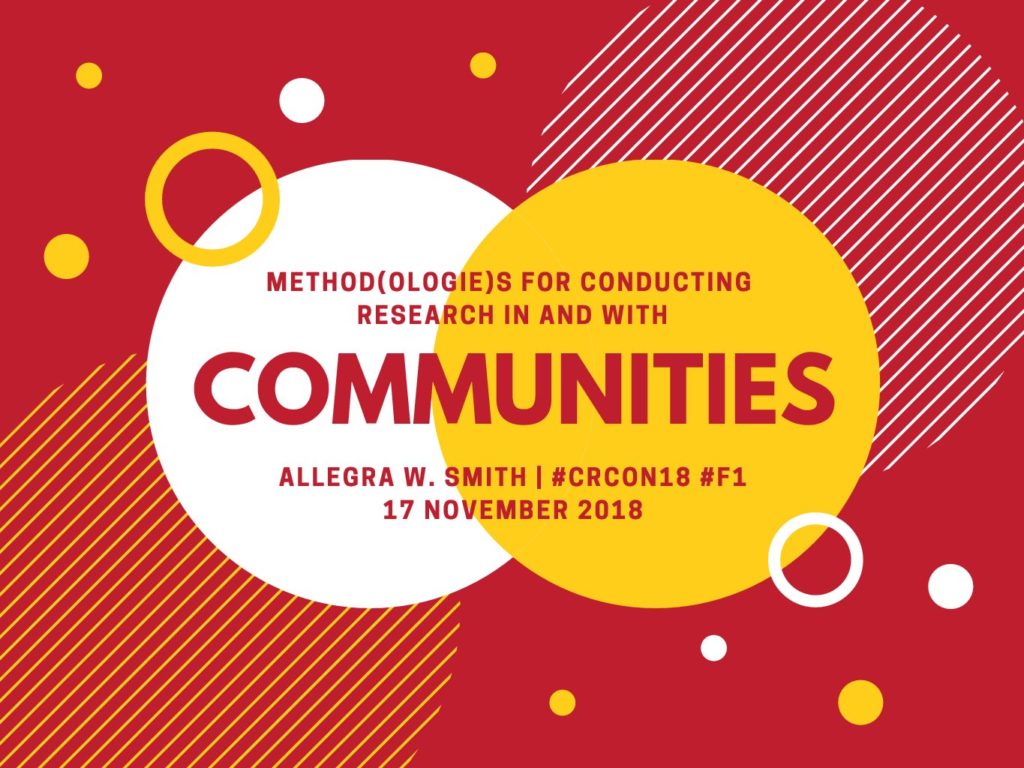
How can we ensure ethical, theoretically grounded practice when conducting research with communities that differ from our own? I describe lessons learned from researching the digital practices of a group of seniors living in a supervised apartment facility. Working with older adults age 70+ presents unique challenges and opportunities for rhetoricians, especially related to storytelling and listening. I illustrate practices such as participant observation, forming mutually beneficial researcher/participant relationships, reciprocal practice and gift-giving, rhetorical listening, and reflexively engaging with researcher subject position. [ Talk | Slides ]
Watson 2016
“Please Internet Responsibly: Rhetorical Feminist Methodologies for a Digital Age”
Louisville, KY: October 2016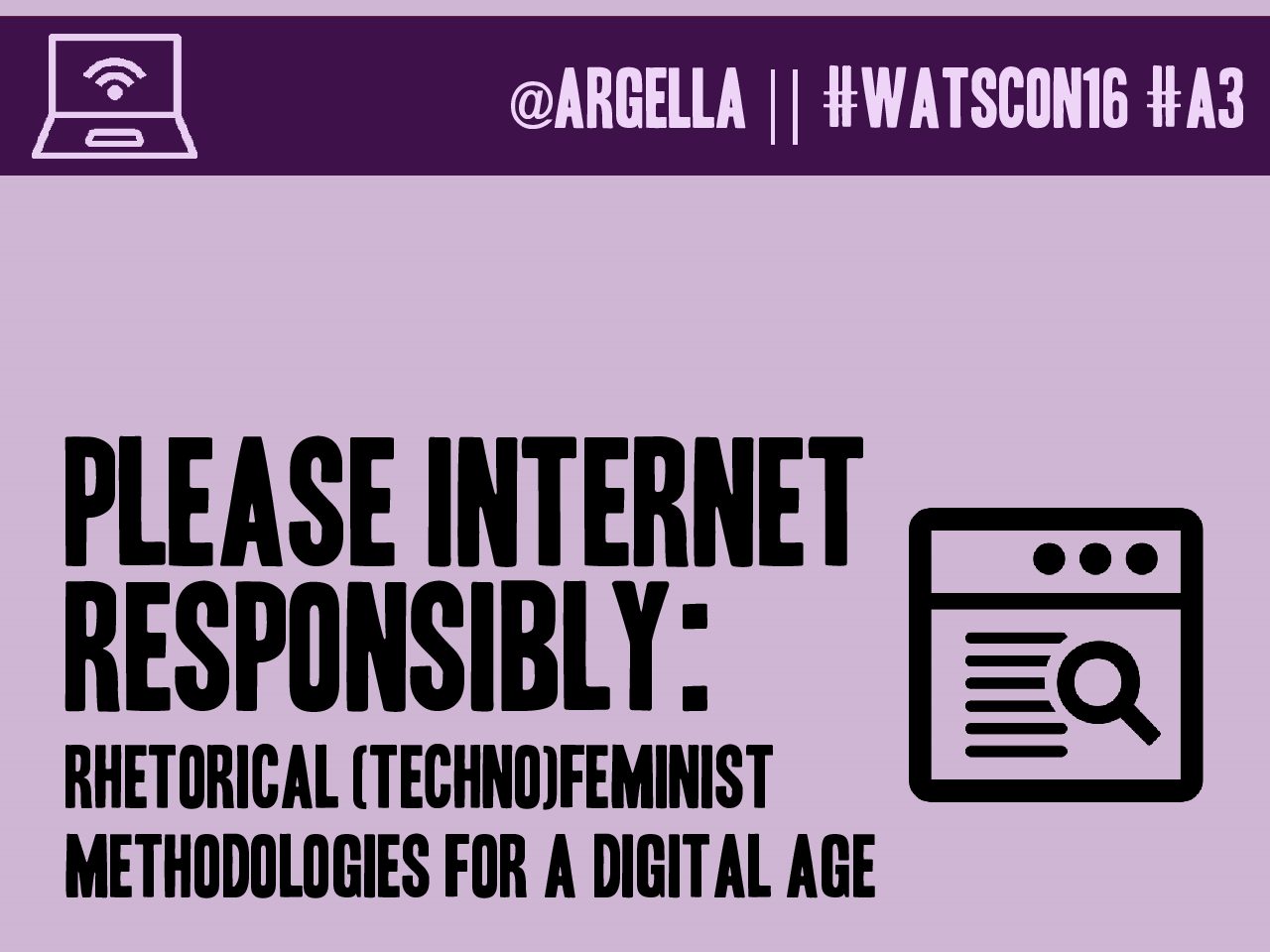
Kristi Prins (Cal Poly Pomona), Kristin Ravel (Rockford University), and I collaborated on a panel, “Mobilizing Digital Feminist Rhetorical Theory and Practice,” at the 2016 Thomas R. Watson Conference on Rhetoric and Composition. The panel considered how feminist rhetorical notions of responsibility can shape both digital rhetorical research and course activities that help students reflect on their own production and distribution of digital texts. We situated our work within feminist rhetorical and digital theories and shared examples of how these theories and practices shape our research practice and our course activities. Focusing on the work of emerging and early-career scholars in the field of rhetoric and composition, my talk highlighted instances of technofeminist research method(ologie)s such as grounding work in the theory of practitioners, employing a positional framework, and engaging in participatory data coding. [ Talk | Slides ]